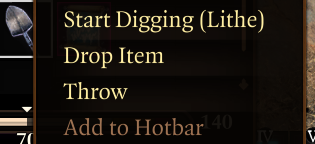this post was submitted on 02 Oct 2023
187 points (99.5% liked)
Baldur's Gate 3
7035 readers
208 users here now
All things BG3!
Baldur’s Gate 3 is a story-rich, party-based RPG set in the universe of Dungeons & Dragons, where your choices shape a tale of fellowship and betrayal, survival and sacrifice, and the lure of absolute power. (Website)
Spoilers
If your post contains any possible spoilers, please:
- Use the text [SPOILER] at the beginning of your title, do not include any spoilers in the title.
- Use the appropriate spoiler markup to conceal that content in the body of your post.
Thank you!
founded 2 years ago
MODERATORS
you are viewing a single comment's thread
view the rest of the comments
view the rest of the comments

DM should have rolled for the player secretly if they didn't want to call attention.
It depends on your table, but I disagree.
If I ask the party for a perception check and they all fail the party should be aware of their choices (in this case, perception is important). If I then surprise them with an enemy they are clear why that happened.
Alternatively in this case it's to locate something, maybe they want to spend a luck point, flash of genius, or other similar ability.
Sometimes I ask for perception checks when there is nothing to notice out of the ordinary just to see them squirm.
My old DM would do this.
He would also sometimes hand players little notes: often full of info that their character would know but had to be kept secret from other players.
But sometimes, the note would be empty aside from a request for the player to not say anything.
The level of tension when the DM hands out a note to everyone but you is... something.
Better still, use passive scores since this is what they're for. If you want your players to make active checks, give them a narrative reason.
But I'm also of the opinion that the more you run your D&D like you'd run anything Powered by the Apocalypse, the better it becomes.